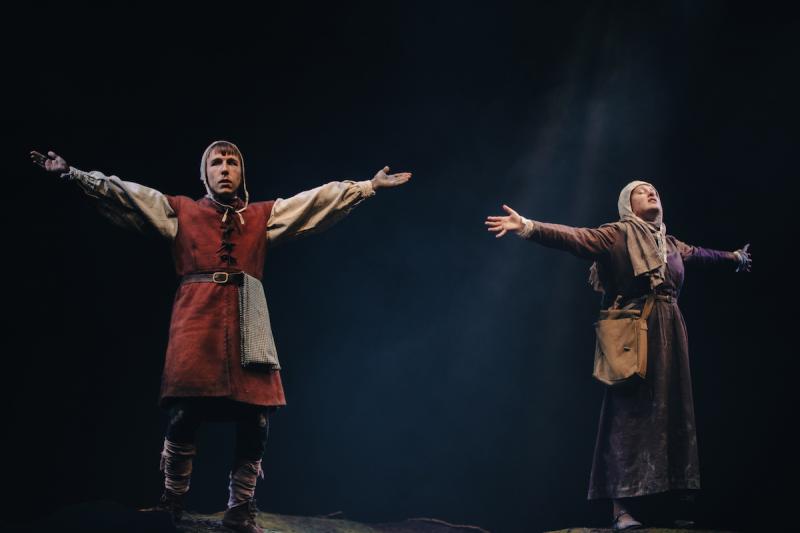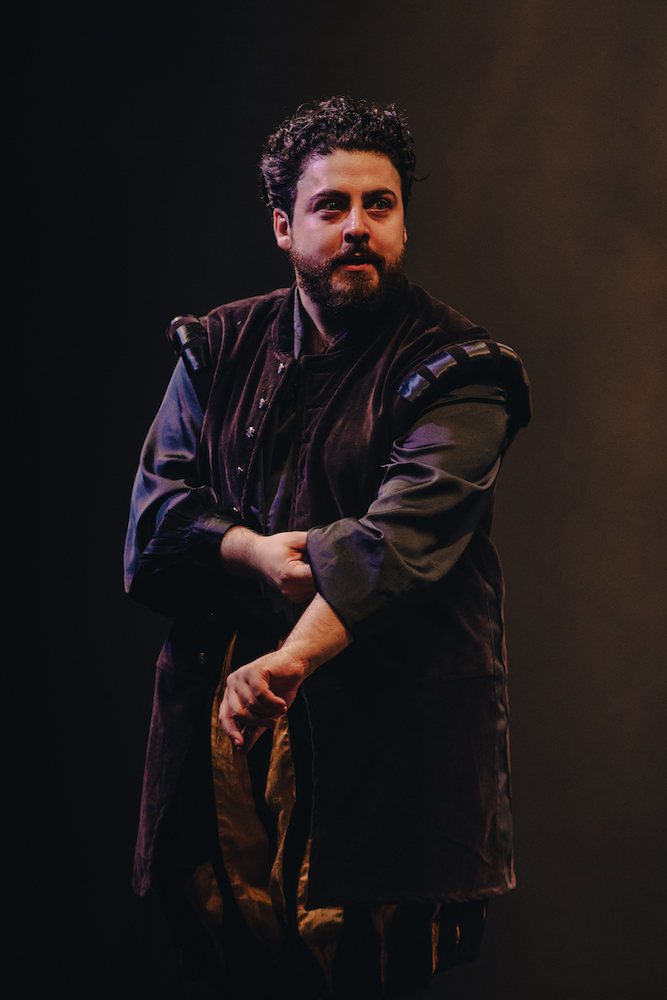The Bounds, Royal Court review - soccer play scores badly | reviews, news & interviews
The Bounds, Royal Court review - soccer play scores badly
The Bounds, Royal Court review - soccer play scores badly
New history play about football has a flawed second half

Every day this week I’m watching a football match, and now – after April’s production of Lydia Higman, Julia Grogan and Rachel Lemon’s Gunter – comes another football stage drama to tear up the turf at the Royal Court’s Theatre Upstairs.
This time it’s the turn of Stewart Pringle’s The Bounds, which opened at Live Theatre in Newcastle in May and has now arrived in London. Set in 1553 in Northumbria, during the Whitsun football game which can last for days and has a pitch that is many miles long, this is a play with a high metaphorical content which not only articulates a distinctly northern voice, but also stages a kind of gothic folk horror show.
Two local young peasants, Percy and Rowan, are members of the Allendale village team, which competes annually with their rivals from Catton in a free-for-all that involves violence, injury and sometimes death. Yes, this is medieval football still being played during the reign of Edward VI, the teenage reforming Protestant monarch who rules from distant London. While Percy and Rowan banter humorously, it is clear that they are redundant in that their position is so far away from the scrum of the game that they can’t even see what is happening or who is doing what in either team.
 With a nod to Samuel Beckett’s Waiting for Godot, they are visited by a rich adult, the wealthy Samuel, and then by a young boy. These representatives of the big outside world, of London and Oxbridge, of power and privilege, bring news of change that disrupts the stability of the peasant world of the village. Contrary to any idea that Renaissance countryside was unchanging for decades, Pringle shows that life was always in flux and that the life situation of the powerless was fluid – always dependent on decision taken far away. A bit like today really. A simple lesson of history.
With a nod to Samuel Beckett’s Waiting for Godot, they are visited by a rich adult, the wealthy Samuel, and then by a young boy. These representatives of the big outside world, of London and Oxbridge, of power and privilege, bring news of change that disrupts the stability of the peasant world of the village. Contrary to any idea that Renaissance countryside was unchanging for decades, Pringle shows that life was always in flux and that the life situation of the powerless was fluid – always dependent on decision taken far away. A bit like today really. A simple lesson of history.
On their grassy knoll, Percy and Rowan are a beautifully realized pair of characters. He is an opinionated lad, loud with the local prejudices and fears of the soil-bound and mud-caked lower orders, clinging to his holding and cottage, and bad-mouthing the villagers of Catton with vulgar hilarity. By contrast, Rowan is more down-to-earth and intelligent, realizing the limitations of a woman’s lot and bearing the scars of masculine aggression, but both more stoical and much less hysterical than Percy. Their interactions are written with energy, humour and compassion, conjuring up both a lost world of those who once laboured in the fields – and having resonance with the situation of North-East England today.
The Bounds is a kind of worset bag of ideas that spill out, roll about the stage for a bit and then are kicked into the long grass. There are insights into local Northumbrian identity, stories of witchcraft and weird imaginings, tales of religion as Catholics are persecuted by Protestants, and plenty of gossip, some of it hilarious, about friends and neighbours. There is also much about platonic friendship and its betrayal, as well as the impact that strangers from afar can have on a community. As the play’s title indicates, this is a story about boundaries being redrawn, both on the land and in personal relationships.
Pringle handles all this very well for the first hour of this 90-minute show. But his evocation of a olde northern England, where boys with birches beat the bounds of the parish every year and mysterious strangers dressed in black cloaks, doublet and hose can only mean trouble, only really goes so far. And not far enough. The problem with the play is that the story runs out of steam – and the playwright doesn’t know what to do with his characters. Or his increasingly apocalyptic themes. Instead of simply imitating Becket and leaving everyone in stasis, he opts for a time-twisting turn that is not only absurd, but also really irritating.
Normally, I am a passionate supporter of dramas that take a dramatic swerve, and blast off in an unnaturalistic – and totally unexpected – direction. But it has to be done well. In this case, it is done badly, with some plodding writing, superficial development and deeply annoying faux visionary material. Added to this, the problem with showing people who are powerless is that you are left with a story about losers, which is psychologically depressing and politically retrograde. The ending of the play is dismally written and dismally disempowering. I feel that northerners deserve better.
Director Jack McNamara, who heads Live Theatre in Newcastle, fields a very good production on designer Verity Quinn muddy set, and the first part of the show is enjoyable. Ryan Nolan’s laddish Percy is both a hooligan and a vulnerable male, while Lauren Waine’s Rowan comes across as a well-balanced sensible counterpoint as well as symbol of female suffering. Soroosh Lavasani (pictured above) lends Samuel an air of privilege as well as sinister fugitive wariness, while Wilbur Conabeare (making his stage debut) and Harry Weston take turns as the precocious Boy. But good performances can’t completely compensate for a plot that, like Gareth Southgate’s England squad, is apt to run out of puff in the closing minutes of the game.
rating
Explore topics
Share this article
The future of Arts Journalism
You can stop theartsdesk.com closing!
We urgently need financing to survive. Our fundraising drive has thus far raised £49,000 but we need to reach £100,000 or we will be forced to close. Please contribute here: https://gofund.me/c3f6033d
And if you can forward this information to anyone who might assist, we’d be grateful.

Subscribe to theartsdesk.com
Thank you for continuing to read our work on theartsdesk.com. For unlimited access to every article in its entirety, including our archive of more than 15,000 pieces, we're asking for £5 per month or £40 per year. We feel it's a very good deal, and hope you do too.
To take a subscription now simply click here.
And if you're looking for that extra gift for a friend or family member, why not treat them to a theartsdesk.com gift subscription?
more Theatre
 Little Brother, Soho Theatre review – light, bright but emotionally true
This Verity Bargate Award-winning dramedy is both entertaining as well as thought provoking
Little Brother, Soho Theatre review – light, bright but emotionally true
This Verity Bargate Award-winning dramedy is both entertaining as well as thought provoking
 The Maids, Donmar Warehouse review - vibrant cast lost in a spectacular-looking fever dream
Kip Williams revises Genet, with little gained in the update except eye-popping visuals
The Maids, Donmar Warehouse review - vibrant cast lost in a spectacular-looking fever dream
Kip Williams revises Genet, with little gained in the update except eye-popping visuals
 Ragdoll, Jermyn Street Theatre review - compelling and emotionally truthful
Katherine Moar returns with a Patty Hearst-inspired follow up to her debut hit 'Farm Hall'
Ragdoll, Jermyn Street Theatre review - compelling and emotionally truthful
Katherine Moar returns with a Patty Hearst-inspired follow up to her debut hit 'Farm Hall'
 Troilus and Cressida, Globe Theatre review - a 'problem play' with added problems
Raucous and carnivalesque, but also ugly and incomprehensible
Troilus and Cressida, Globe Theatre review - a 'problem play' with added problems
Raucous and carnivalesque, but also ugly and incomprehensible
 Clarkston, Trafalgar Theatre review - two lads on a road to nowhere
Netflix star, Joe Locke, is the selling point of a production that needs one
Clarkston, Trafalgar Theatre review - two lads on a road to nowhere
Netflix star, Joe Locke, is the selling point of a production that needs one
 Ghost Stories, Peacock Theatre review - spirited staging but short on scares
Impressive spectacle saves an ageing show in an unsuitable venue
Ghost Stories, Peacock Theatre review - spirited staging but short on scares
Impressive spectacle saves an ageing show in an unsuitable venue
 Hamlet, National Theatre review - turning tragedy to comedy is no joke
Hiran Abeyeskera’s childlike prince falls flat in a mixed production
Hamlet, National Theatre review - turning tragedy to comedy is no joke
Hiran Abeyeskera’s childlike prince falls flat in a mixed production
 Rohtko, Barbican review - postmodern meditation on fake and authentic art is less than the sum of its parts
Łukasz Twarkowski's production dazzles without illuminating
Rohtko, Barbican review - postmodern meditation on fake and authentic art is less than the sum of its parts
Łukasz Twarkowski's production dazzles without illuminating
 Lee, Park Theatre review - Lee Krasner looks back on her life as an artist
Informative and interesting, the play's format limits its potential
Lee, Park Theatre review - Lee Krasner looks back on her life as an artist
Informative and interesting, the play's format limits its potential
 Measure for Measure, RSC, Stratford review - 'problem play' has no problem with relevance
Shakespeare, in this adaptation, is at his most perceptive
Measure for Measure, RSC, Stratford review - 'problem play' has no problem with relevance
Shakespeare, in this adaptation, is at his most perceptive
 The Importance of Being Earnest, Noël Coward Theatre review - dazzling and delightful queer fest
West End transfer of National Theatre hit stars Stephen Fry and Olly Alexander
The Importance of Being Earnest, Noël Coward Theatre review - dazzling and delightful queer fest
West End transfer of National Theatre hit stars Stephen Fry and Olly Alexander
 Get Down Tonight, Charing Cross Theatre review - glitz and hits from the 70s
If you love the songs of KC and the Sunshine Band, Please Do Go!
Get Down Tonight, Charing Cross Theatre review - glitz and hits from the 70s
If you love the songs of KC and the Sunshine Band, Please Do Go!

Add comment